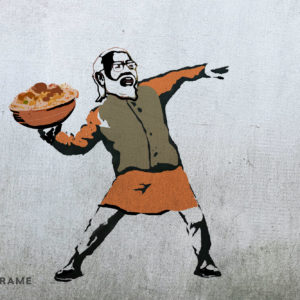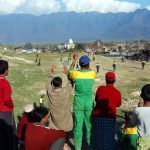Kashmir Premier League mired in political spats
The new league has gone ahead despite the politics surrounding it, but it could mean more trouble for Pakistan-India relations – and the territory itself.
Author:
13 August 2021

Cricket is the latest weapon India is using to continue its decades-old battle with Pakistan over Kashmir. First the Board of Control for Cricket in India (BCCI) threatened international players not to take part in the new Kashmir Premier League (KPL), saying it wouldn’t allow them in India for cricket-related work, and then it appealed to the International Cricket Council (ICC) to not sanction the inaugural tournament.
The latter did not work, with the global cricketing body saying “non-international cricket is not our jurisdiction so it is not something we can be involved in”. But the players were spooked. Former English spinner Monty Panesar was the first to pull out of the tournament.
“I have decided not to participate in the KPL because of the political tensions between India and Pakistan over Kashmir issues. I don’t want to be in the middle of this, it would make me feel uncomfortable,” he wrote on Twitter soon after the BCCI showed its dismay.
He later said he “would have lost huge opportunities to work in India” had he decided to play in the tournament. Matt Prior, Phil Mustard and Owais Shah from England and Tino Best from the West Indies also withdrew soon after Panesar.
Related article:
Proteas legend Herschelle Gibbs, who kept his word to play in the tournament, blew the lid on the BCCI’s bullying. Gibbs labelled the powerful body’s actions as “completely unnecessary” and “ludicrous”, revealing that he was threatened that he would never be allowed entry to India for cricket work if he took part in the KPL.
The Pakistan Cricket Board (PCB), a permanent member of the ICC that gave the tournament the green light so that it can rope in international cricketers, slammed the BCCI’s actions. “The PCB considers that the BCCI has brought the game into disrepute by issuing warnings to multiple ICC members to stop their retired cricketers from featuring in the Kashmir Premier League, further threatening they will not be allowed entry into India for cricket-related work,” it said in a statement.
“Such conduct from the BCCI is completely unacceptable, against the preamble of the spirit of cricket and sets a dangerous precedent, which can neither be tolerated nor ignored. The PCB will raise this matter at the appropriate ICC forum and also reserves the right to take any further action that is available to us within the ICC charter.”
In response, the BCCI maintained that it was “toeing our government’s line” by warning cricketers of not getting to play or work in India after participating in the KPL.
Off-the-field agendas
The series of events surrounding the KPL, which has been advertised as an effort to promote sports among the people of Kashmir, is another example of how deeply politics in the region is rooted in cricket. Jay Shah, the son of India’s home minister, Amit Shah, is the secretary of the BCCI, and some other members also have political connections. But the situation is not much different in Pakistan, where the PCB’s decisions have also come under criticism of being politically driven.
The politicisation of the game is among the reasons Pakistan and India have not played a bilateral series since the 2012-2013 season, nor have they seen each other on the field in Test cricket since 2007-2008. This is despite their clashes capturing the cricketing world’s imagination. In the 2019 ICC World Cup, 229 million people watched India and Pakistan’s contest at Old Trafford in England. It formed 60% of the overall viewers of the whole tournament.
The BCCI’s antics have unwittingly promoted the KPL, bringing the tournament into focus for many people who did not know about the mega T20 cricket event in Pakistan-administered Kashmir. Announced in December 2020, it was called a project that would “put Kashmir on the world sports map” by Shehryar Khan Afridi, chairperson of Pakistan’s parliamentary special committee on Kashmir, at the event.
Related article:
The involvement of star cricketers, including former Pakistan captains Shahid Afridi and Wasim Akram, instantly gave it some gravitas and corporate sponsors also showed interest, making it easy for the organisers to fast-track the league’s start.
Six teams – five of which were named after different cities of Pakistan-administered Kashmir – were announced to take part. It was decided that each team must include five local Kashmiri cricketers, apart from Pakistan players and retired players from other countries. The tournament was initially set to take place in May, but with Covid-19 taking its toll it kicked off on 6 August.
Former and current Pakistan cricket stars Afridi, Shoaib Malik, Imad Wasim, Mohammad Hafeez, Kamran Akmal and Shadab Khan were named the captains of the six franchises. The Rawalakot Hawks and Mirpur Royals squared off in the opening match, attracting a huge crowd. As the game was live-streamed, people from around the world were also able to watch it.
This latest spat between India and Pakistan will further diminish the chances of the two nations forging bilateral cricket ties, as was rumoured earlier this year. “Cricket between Pakistan and India is very important,” Afridi said at the time. “Sports should be kept away from politics. Relations between the two countries can improve because of cricket.”


